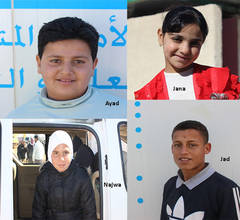Five stories of hope from Zaatari refugee camp
The benefits of education for refugee children are huge. In the Zaatari refugee camp in northern Jordan, a UNESCO education project is giving new hope to Syrian refugee children. The project brings not only education but also psychosocial support to around 200 out-of-school school-age children in the Zaatari camp, which is home to 80,000 Syrian refugees who escaped the chaos of the Syrian war.
Half of the 30,000 Syrian school-aged children in the camp are out of school.
Four children and a teacher share how UNESCO’s project has given them new hope. The project is funded by the European Union and implemented in partnership with War Child UK.
Ayad, 11, learning to make friends again
Eyad watched two of his friends get shot and die in Syria, the final straw for his father who decided to move his family to Jordan. The event left him anxious and aggressive and unable to study. Along with 109 other boys and girls, he has completed the 3-month informal education and psychosocial support programme which has allowed him to continue his education and make friendship.
“They had different trust exercises which helped to reduce my anxiety, while also strengthening my relationships with my new friends. I barely ever skipped a day, I absolutely loved coming here!” he said.
His hope for the future? “I want to be a teacher, just like my teacher Mr. Mahmoud. He made me feel loved and even respected. I want to make other children have what I was given.”
Jad, 15, making educational strides
The programme has helped Jad put some of his trauma behind him and make great educational advances. “I admit I was a bully before joining this programme, but I honestly didn’t know what else to do to protect myself,” he said. In Jad’s original placement exams, he scored only 18/100 in maths and 0/100 in Arabic, but in the final exams he and scored 97/100 and 99/100, respectively. He now has post-basic reading, writing and pronunciation skills and is more sociable and cheerful.
His hope for the future? “I want to be a maths teacher or a truck driver,” he said.
Jana, 8, forgetting the sound of gunfire
Jana remembers one thing very clearly from her arrival at the camp.
“I felt happy and relieved. The sounds of gunshots weren’t there anymore. I learned a lot coming here. I can now read and write well, considering that I wasn’t able to before, and I’m so excited about what I can do with that knowledge! I also met so many new friends, and we’re inseparable now.
Her hope for the future? “I want to be a teacher for children right here in the camp if we stay that long.”
Najwa, 10, overcoming severe trauma
Najwa came to the camp after suffering a terrible blow.
“My dad died in Syria. During the siege on our town by the warring armies, he went out to get us some food because we were starving, but he never made it back alive. That’s when my mother decided to take us to Jordan.”
She too has made huge advances in school with her original placement scores only 10/100 in math and 0/100 in Arabic rising to 100/100 scores in both subjects.
Her hope for the future? “I want to be a painting teacher,” she said. “I’m not letting my dream go.”
Mahmoud the teacher
Mahmoud is a 27-year-old Syrian refugee who works as a teacher with War Child UK as part of their UNESCO-EU project team in Zaatari camp.
“When I first arrived here, I thought our stay would be temporary, and that soon enough we’ll all be back home. When that didn’t happen I started looking for a job. I first looked for a teaching position, but didn’t find anything in the camp back then, so I gathered up the neighbourhood’s children and conducted classes for them. I felt like I needed to help the children, since they weren’t getting their education anywhere else.”
Mahmoud is very popular with the children who attend the programme.
“I like to make the children feel involved and excited, and I like to make them laugh throughout the class. I am a mentor as well as a teacher, and I always try to be a good role model for them.”
His hope for the future? “I want my students to go back to formal schools, and as for myself, I want to continue my education and get my master’s degree. Learning never stops, and nor should I.”
- Read more on World Refugee Day.
<- Back to: All news



